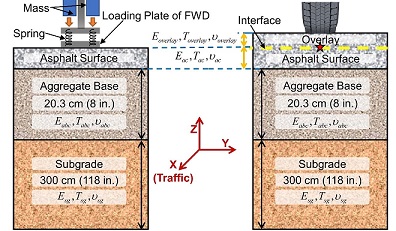Reflective cracking remains a significant challenge in asphalt overlays, leading to premature pavement failure. The previous study, RP 2019-19, successfully ranked geosynthetic materials in mitigating reflective cracking based on laboratory performance.
The primary objective of this study is to evaluate the field performance of geosynthetic interlayers and compare the field performance against laboratory test results.
Research efforts to accomplish this objective resulted in a step-by-step procedure for predicting life of geosynthetic-reinforced pavements under real-life conditions using existing pavement condition data, such as falling weight deflectometer (FWD) and crack survey data.
Several methodologies were developed to support this prediction procedure, including:
- laboratory measurement of crack resistance of geosynthetic-reinforced asphalt beam specimens using the four-point bending notched beam fatigue test,
- determination of dynamic modulus of damaged asphalt layers in existing pavements,
- prediction of tensile strain at the bottom of asphalt overlay using simulated FWD deflection parameters, and
- prediction of damage index for the traffic and environmental conditions of the project in question.

Pavement structures used to analyze pavement
responses: (left) without overlay and (right) with overlay
The developed procedure was calibrated using Pavement Management System data from five routes selected among NCDOT's interlayer projects. The calibrated procedure was verified using the pavement design and condition survey data from the US 1 sections at Moore County near Aberdeen.
The findings from this study contribute to the prediction of field-verified performance of pavements reinforced with different geosynthetic products under realistic loading and environmental conditions. Life-cycle cost analysis using the predicted performance allows the selection of proper geosynthetic products for a given project. These results will support NCDOT engineers in making informed decisions for pavement maintenance applications, thereby enhancing the durability and cost-effectiveness of asphalt overlays in North Carolina.
